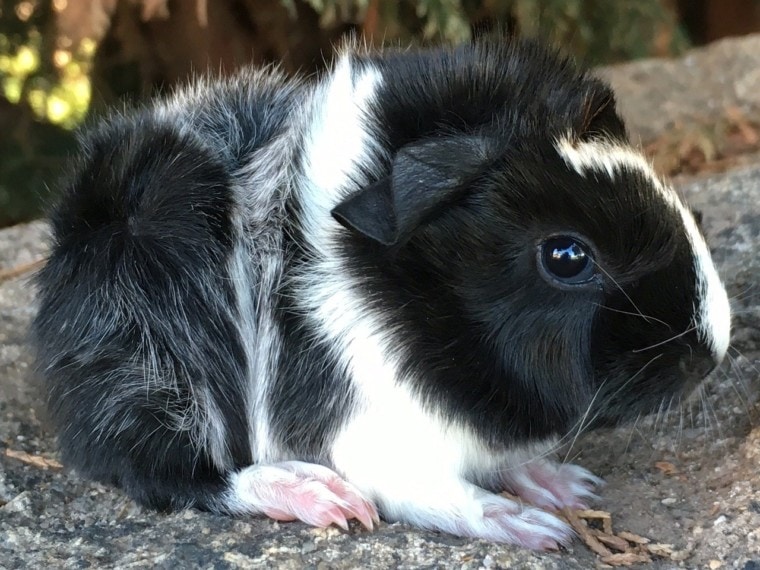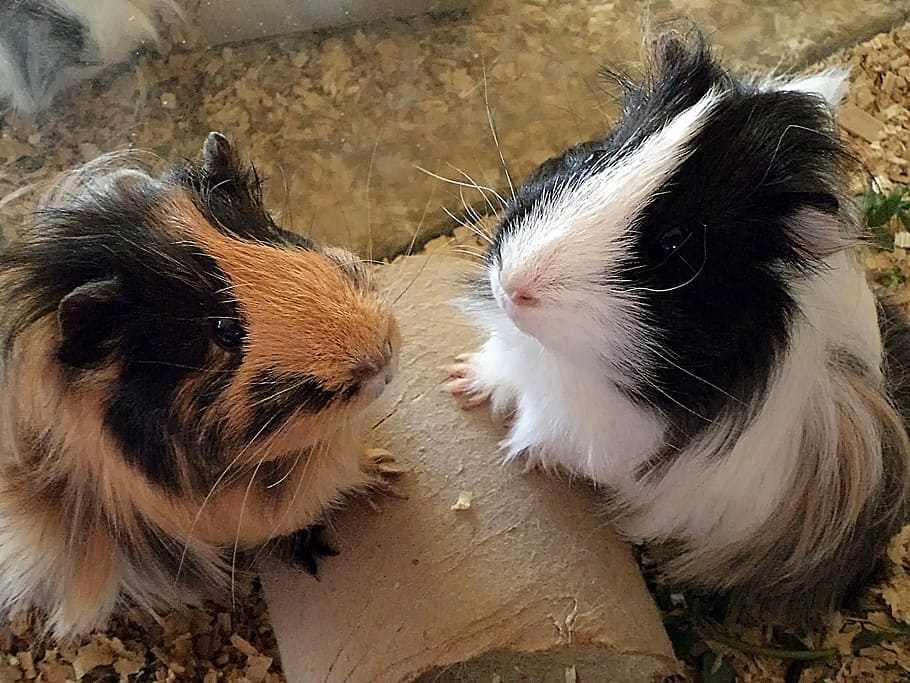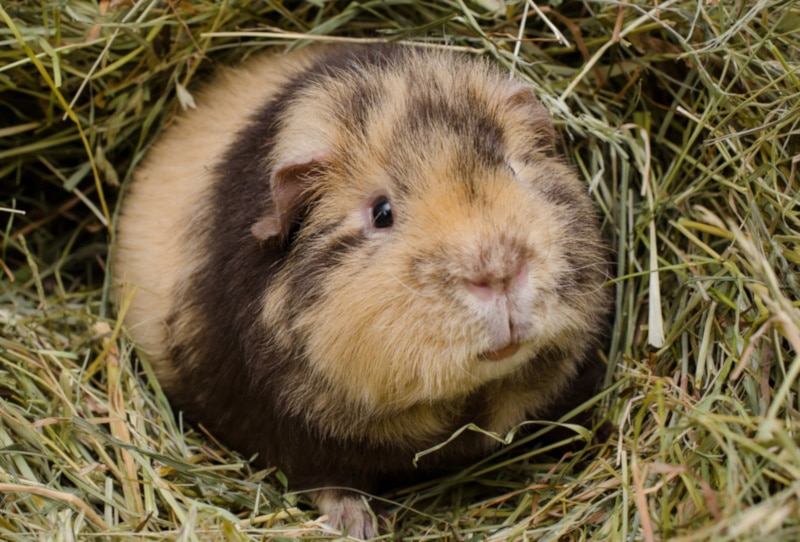
The Sheba guinea pig is a popular guinea pig breed due to their loving temperament and long, luxurious coats that resemble Himalayan yaks. In reality, their coats are medium-length and easy to care for. Sheba guinea pigs are often bred for shows, but they may be great pets for more casual owners.
Learn all there is to know about Sheba guinea pigs, their temperament, and their care needs to determine if they’re the right choice for your family.
| Size: | Standard |
| Weight: | 1–3 pounds |
| Lifespan: | 5–7 years |
| Similar Breeds: | Abyssinian, Peruvian |
| Suitable for: | Experienced rabbit owners with other rabbits |
| Temperament: | Playful, social, skittish |
The Sheba guinea pig is also known as the Sheba mini yak for its resemblance to the Yak, a domesticated species of long-haired cattle in the Himalayas. Despite this name, it’s not a miniature guinea pig. These guinea pigs are popular for their unique look and, surprisingly, don’t have a lot of grooming requirements for that long coat.
Sheba Guinea Pig Characteristics
How Much Do These Guinea Pigs Cost?
Sheba guinea pigs were bred in Australia in the 1960s from the long-haired Peruvian guinea pigs and the short-haired Abyssinian guinea pigs. Though they are still not formally recognized by breed registries or the ACBA, they are popular among pet owners for their looks and lovable nature.
You can expect to pay between $50 and $100 for a Sheba guinea pig. They may be available in rescues, which typically charge adoption fees of around $25 to $35 for pocket pets like guinea pigs.

Temperament & Intelligence of the Sheba Guinea Pigs
These guinea pigs are popular because of their friendly and affectionate temperament. Sheba guinea pigs are the ideal combination of cuteness and “personality”. While some people may not think that guinea pigs are intelligent, these little fellows still need mental stimulation in the form of exercise and guinea pig-friendly toys. They are active for most of the day, so you do not want them to get bored.
Do These Guinea Pigs Make Good Pets?
Yes, Sheba guinea pigs are great pets. They’re very lovable and social. These guinea pigs are more skittish than other breeds of guinea pigs, however, and do well in quieter home environments with older children.
Does This Guinea Pig Get Along With Other Pets?
Sheba guinea pigs enjoy the companionship of each other, so they’re best kept in colonies. It’s not a good practice to allow guinea pigs to interact with dogs or cats, no matter how gentle, because they’re predators and may enjoy chasing a guinea pig.
Things to Know When Owning a Sheba Guinea Pig:
Food & Diet Requirements
Guinea pigs require high-quality diets to stay healthy. Like humans, guinea pigs can’t make their own vitamin C and need to get it from their diet. Commercial pelleted food is ideal and provides your guinea pig with all the nutrition it needs, which you can supplement with some leafy greens and other vegetables. Timothy hay should be given with each feeding for forage.
Fruit should be given sparingly as it’s high in sugar, which isn’t good for your guinea pig. Avoid giving your guinea pig too many seeds and nuts as well. These are good occasional treats but shouldn’t be part of their daily diet.
Habitat & Enclosure Requirements
Guinea pigs require cages, not plastic tubs, glass aquariums, or cages with wire floors. One guinea pig needs at least 7.5 square feet of space, which is about 30 by 36 inches. If you plan to house more than one, which is preferred for a social breed like the Sheba, you will need about another 3 square feet of space per additional guinea pig. Ideally, provide the largest space you can accommodate to give your guinea pigs plenty of space for play and exercise.

Exercise & Sleeping Needs
All guinea pigs need a lot of regular exercise. They’re not suited for hamster wheels or similar toys. Guinea pigs housed together will play together, but you should also take them out for open play sessions in bigger areas in your home.
Training
Guinea pigs don’t have the trainability of dogs or cats, but they can be trained to basic commands like coming when called and using a litter box. They do best with positive reinforcement training, such as clicker training, instead of harsh methods with punishment. Use training treats that are healthy, such as small pieces of fibrous vegetables instead of fruit or nuts.
Grooming
Despite that long, luxurious coat, Sheba guinea pigs are actually medium-haired breeds with slow-growing hair. They’re not as high maintenance as you’d expect, and that coarse coat gives them a naturally scruffy look. Regular brushing and the occasional bath are all it takes to keep your guinea in good shape. They do need nail trimming at least once a month.
Lifespan and Health Conditions
A healthy Sheba guinea pig can live 5 to 7 years with proper care, but they are prone to some health conditions. Pneumonia is a big concern, though a well-cared-for pig with a proper diet has better natural defenses. Guinea pigs can also develop diarrhea easily with the wrong diet, and scurvy is a concern if you don’t provide enough vitamin C. Improper diet can also contribute to obesity and dental disease. Bumblefoot, a condition that causes sores on the bottom of the feet, can also occur.
 Male vs Female
Male vs Female
Some people claim that male and female guinea pigs are different. The males are supposedly bolder and feistier, while the females are more laid back. They’re all individuals, however, so there’s no clear distinction between males and females. It comes down to your personal preferences. Spaying or neutering isn’t necessary for guinea pigs unless you’re housing males and females together.

3 Little-Known Facts About Sheba Guinea Pigs
1. Guinea Pigs Don’t Come from Guinea
Despite the name, guinea pigs don’t originate in Guinea. They come from the Andes region in South America. Sheba guinea pigs originated in Australia from crossbreeding the Peruvian and Abyssinian guinea pigs.
2. Guinea Pigs Are Active for 20 Hours a Day
Guinea pigs are extremely active. They’re generally awake for up to 20 hours a day, which is why it’s important to give them plenty of space and playtime.
3. Guinea Pigs Make 11 Individual Sounds
Guinea pigs are often associated with the “wheek-wheek” sound, but that’s just one of 11 sounds they make. This noise is from excitement, but they also make a purring sound when they’re relaxed and squeak if they’re startled.
Final Thoughts
Sheba guinea pigs make great pets for guinea pig lovers. Though they look high maintenance, these pigs are actually easy to groom and have a cute, scruffy appearance. Sheba guinea pigs are friendly and social, so it’s best to keep them with a few companions to ensure they’re happy and active.
Featured Image Credit: MiffieHoneyPixs, Pixabay








